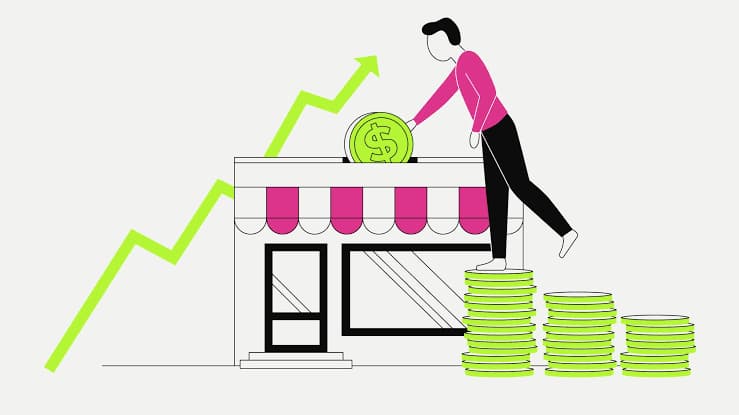👋 Introduction: Why Future-Proof Matters
We’re living in a world where yesterday’s “safe bet” businesses are today’s cautionary tales. AI is disrupting everything. Customer behaviors are changing faster than ever. So what does that mean for someone like you—someone who wants to start a business in 2025?
It means you need to think beyond trends and look for ideas that are future-proof. Businesses that:
- Can survive technology shifts
- Work with AI, not against it
- Solve real human problems
- Are adaptable, not stuck in the past
This blog dives into 7+ business ideas that tick those boxes. Real examples, strategic insights, and a bit of heart—because the future of business isn’t just about algorithms; it’s about people.
🌐 1. Human-Centered AI Services
AI isn’t just for big corporations. In 2025, it’s a tool you can use to create real value—especially if you know how to make it human.
What It Looks Like:
- AI-powered content creation for small businesses (blogs, ads, product descriptions)
- AI chatbots and CRM support for local brands
- Personalized AI coaching for individuals (career advice, writing help, etc.)
Example:
A Gen Z entrepreneur in Bangalore launched a service helping local bakeries write better product descriptions using AI. She charges ₹10,000/month for ongoing content refreshes—way cheaper than hiring a full-time copywriter.
💡 2. Health & Wellness Micro-Brands
Wellness isn’t a passing trend. It’s a cultural shift. But forget generic “fitness influencer” stuff. In 2025, people want hyper-personal, authentic wellness experiences.
Niche Opportunities:
- Localized herbal teas or adaptogen blends tailored to city stress
- Small-batch skincare using traditional recipes
- Guided wellness experiences (like meditation, sound baths) offered in small groups
Case Study:
A young founder in Delhi created “Soulful Sundays”—a 90-minute guided meditation and tea ceremony for stressed professionals. It’s booked out weekly.
📦 3. Circular Economy Businesses
Sustainability is no longer optional. It’s the baseline. Gen Z in particular is driving demand for circular economy businesses: ones that reuse, repair, or upcycle.
How to Tap In:
- Launch a clothing resale platform for your college or city
- Offer repair/refurb services for old electronics
- Start a community tool library (rentals for drills, camping gear, etc.)
Example:
A 24-year-old from Pune runs a laptop repair and resale hub out of a coworking space—his customers love that it’s cheaper and better for the planet.
🏘️ 4. Remote Work Enablement & “Third Spaces”
Even in 2025, remote work is here to stay. But people want community, not just Wi-Fi. There’s a huge market for:
- Cozy coworking cafes with curated vibes
- Hybrid work support (virtual team-building, culture workshops)
- Micro-retreats for remote teams—think 3-day creative sprints in nature
Example:
A small team in Goa built “The Huddle,” a beachside coworking + retreat spot that blends work, wellness, and creative energy. It’s packed in the off-season when remote workers flee cities.
🛠️ 5. Niche Skill Marketplaces
The “generalist” job market is saturated. But specialists in even tiny niches are thriving. You can create a platform to connect niche talent with those who need it.
Ideas:
- Marketplace for 3D artists or animators
- Local directory for ethical fashion tailors
- Curated pool of micro-influencers for small brands
Case Study:
A 21-year-old from Jaipur built a mini-marketplace for local craftspeople—embroiderers, potters, and woodworkers. She takes a small commission on each sale.
🎧 6. Audio & Voice-First Ventures
With podcasts, audiobooks, and voice AI booming, audio-first businesses are a smart play.
You Could Start:
- A local history podcast telling your city’s hidden stories
- Audio production services for brands (scriptwriting, editing)
- Voiceover talent hub for multilingual content (especially valuable in India!)
Example:
In Hyderabad, a small agency works with brands to localize ads in Telugu, Hindi, and English using professional voice actors.
📚 7. Micro-Education Studios
Traditional education is struggling to keep up. But small, focused, skill-based courses are booming.
Build:
- Local workshop series on personal finance, creative writing, or coding basics
- Digital products like e-books, templates, or Notion courses
- Hybrid programs: 1-week intensives or weekend bootcamps
Example:
A student in Mumbai hosts monthly workshops teaching AI tools for freelancers—he started with 5 people, now has a waiting list.
🌱 The Common Threads: Why These Work
These ideas might sound different, but they share three things that make them future-proof:
✅ Human at the Core
Even with AI and automation, people crave genuine connections and real stories.
✅ Flexible & Adaptable
They’re small enough to pivot if trends change—and fast enough to ride new waves.
✅ Community-Driven
They’re built on trust, shared values, and real impact—things that never go out of style.
💬 Conclusion: The Future Isn’t Just Tech—It’s People + Tech
Building a business in 2025 isn’t about who can code the fastest or scale the biggest. It’s about who can see the real needs—emotional, cultural, social—and blend them with the best of technology.
If you’re Gen Z, or simply someone who wants to build something that matters—start small, think long-term, and keep the human element at the center.
You don’t need to be the next Google. You just need to be the next person who actually listens and solves real problems.
📝 Quick Takeaway Checklist:
- Pick an idea that blends tech + human value
- Test it with a small local audience first
- Use AI to make processes faster, not to replace your vibe
- Stay curious—trends change, but core human needs stay the same
- Focus on relationships and community from Day 1






